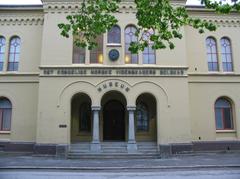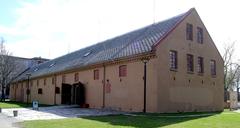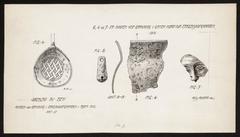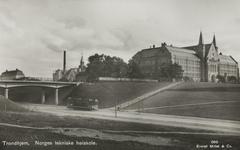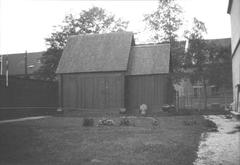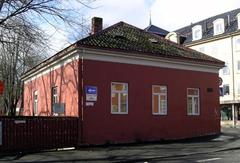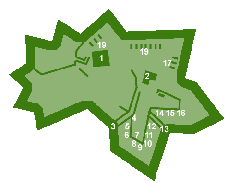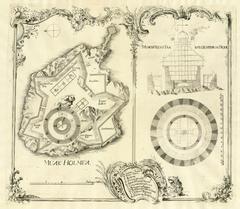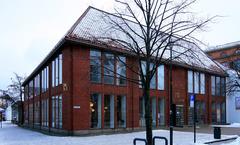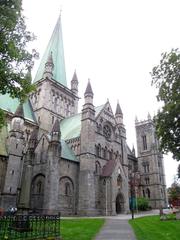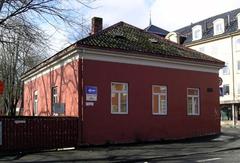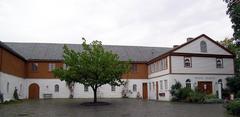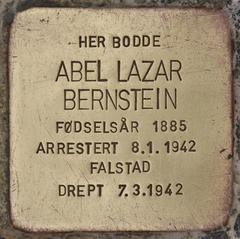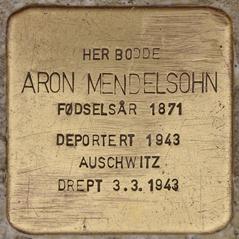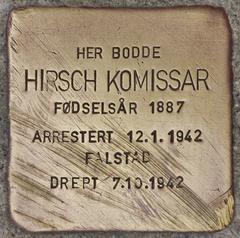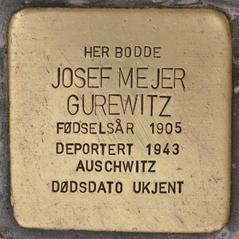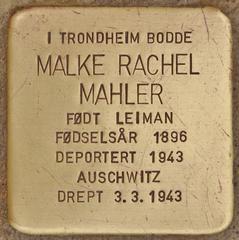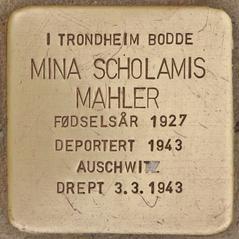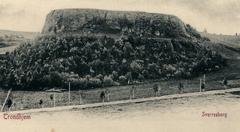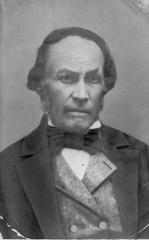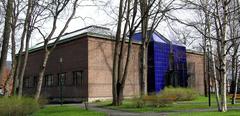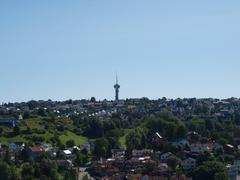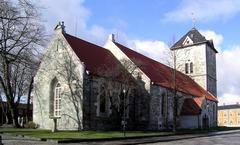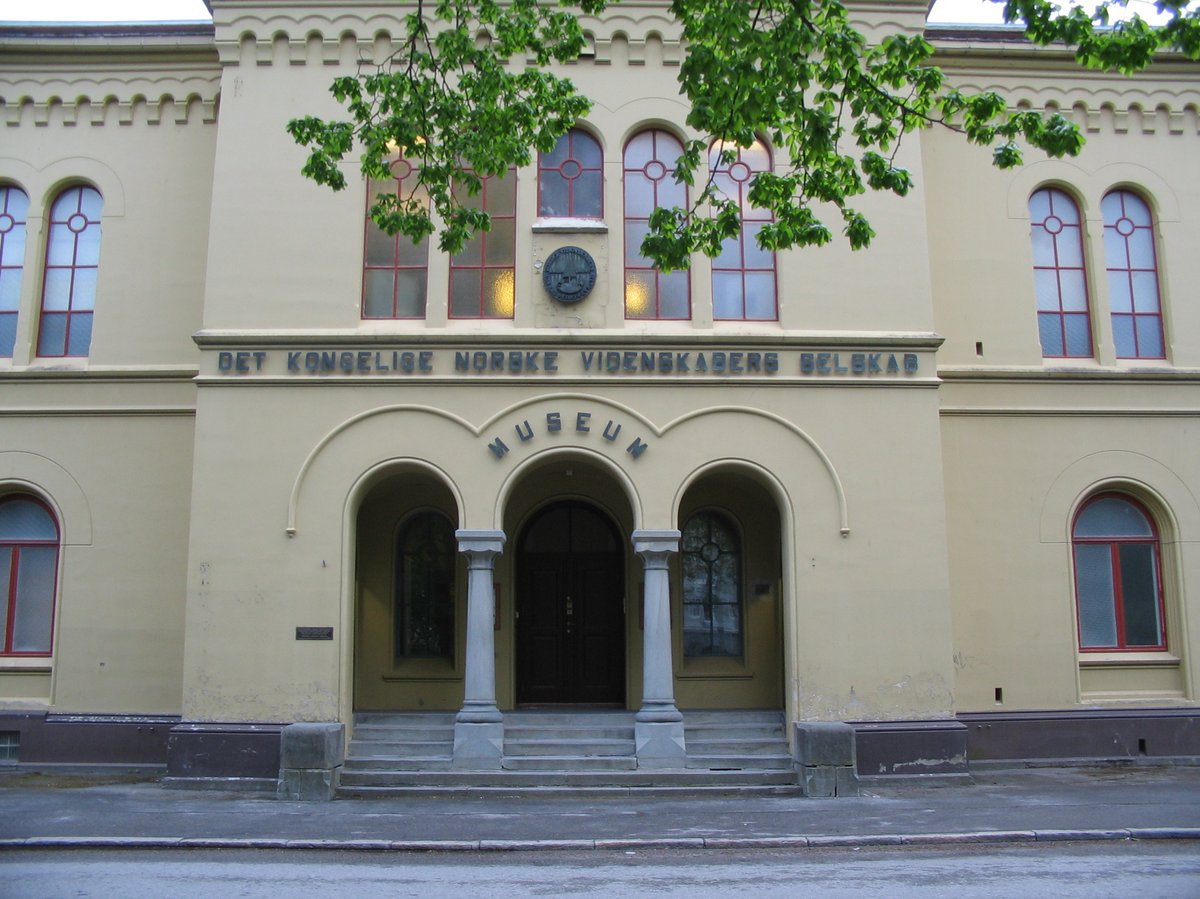
NTNU University Museum Visiting Hours, Tickets, and Trondheim Historical Sites Guide
Date: 14/06/2025
Introduction
Nestled in Trondheim’s historic Kalvskinnet district, the NTNU University Museum stands as a bastion of Norwegian scientific inquiry, cultural heritage, and natural history. Established in 1760 as part of the Royal Norwegian Society of Sciences and Letters, it is among the oldest museums in Norway, famed for its pioneering role in academic research and public education. Its rich legacy is reflected in vast collections, groundbreaking exhibitions like “Ivory of the Sea,” and scenic botanical gardens that showcase Norway’s diverse flora.
This comprehensive guide provides visitors with all the essential information—visiting hours, ticketing, accessibility, directions, and highlights of the museum’s historical significance. Whether you are a history buff, science enthusiast, or a family seeking engaging activities, the NTNU University Museum offers a multifaceted cultural experience that brings Norway’s past and present to life.
For the latest updates on exhibitions, opening hours, and tickets, always consult the NTNU University Museum official website. Supplementary resources such as Norwegian SciTech News can further enrich your visit.
Table of Contents
- Introduction
- Historical Overview
- Academic Role and Research Leadership
- Architecture and Facilities
- Planning Your Visit: Hours, Tickets, and Accessibility
- Collections and Exhibitions
- Botanical Gardens
- Visitor Experience, Services, and Tips
- Community Impact and Collaboration
- Frequently Asked Questions (FAQ)
- Visuals and Media
- Plan Your Visit and Stay Connected
- References
Historical Overview
Founded in 1760, the NTNU University Museum began as the DKNVS Museum, marking Norway’s first institution dedicated to natural sciences and cultural heritage. Over centuries, its collections have grown through donations and scholarly acquisitions, reflecting Enlightenment values and advancing the cataloguing of Norway’s natural world.
The 19th and 20th centuries saw the museum become a regional research and education hub, especially after its affiliation with the Norwegian Institute of Technology (now NTNU) in 1926. Today, it serves as a bridge between academic research and public engagement, preserving and promoting Norwegian heritage (NTNU University Museum About).
Academic Role and Research Leadership
National Leader in Heritage and Science
With over 1.5 million objects—botanical specimens, zoological samples, archaeological artifacts, and ethnographic materials—the museum is a cornerstone of scientific research and conservation in Norway. It is a key partner in national and international initiatives, including the Nordic Research School for Museums and Cultural Heritage (NEMO News). Research areas span paleontology, botany, zoology, archaeology, and cultural history.
Bridging Academia and Public Engagement
The museum is both a research institution and a public museum, offering exhibitions, educational programs, and guided tours for all ages. Innovative, interactive displays and multimedia presentations make complex topics accessible, while school and family programs foster lifelong learning.
Conservation and Stewardship
Cutting-edge conservation laboratories work to stabilize and restore artifacts, while digitization projects expand access to collections worldwide. The museum conducts archaeological fieldwork and heritage management throughout Central Norway in collaboration with local authorities.
Architecture and Facilities
The main museum complex on Erling Skakkes gate 47 comprises two primary buildings:
- Gunnerushuset: The iconic yellow building, home to archaeological and cultural history exhibitions, including artifacts from the Stone, Bronze, and Iron Ages, and the exhibition “1760 – Science at the Edge of the World” (Wikipedia).
- Suhmhuset: Across the car park, this building hosts exhibitions on medieval Trondheim and natural history, as well as temporary exhibitions like the 2025 “Ivory of the Sea” (NTNU Exhibitions).
Both buildings blend 19th-century architecture with modern amenities, including elevators, ramps, cloakrooms, and a museum shop. Recent renovations emphasize accessibility and sustainability.
Planning Your Visit: Hours, Tickets, and Accessibility
Opening Hours
- Gunnerushuset and Suhmhuset:
Tuesday–Sunday: 11:00–16:00
Closed Mondays and public holidays
(Note: Hours may vary seasonally—check the official website before visiting.)
Tickets and Admission
- General admission: NOK 120
- Reduced (students, seniors): NOK 80
- Children under 16: Free
- Family and group tickets available
- Purchase tickets online or at the entrance (NTNU Plan Your Visit)
Getting There and Accessibility
- Address: Erling Skakkes gate 47B, Trondheim
- Public Transport: Bus lines 5 and 18 stop nearby; a short walk from Trondheim Central Station
- Parking: Limited spaces, with designated spots for visitors with disabilities
- Accessibility: Both buildings are wheelchair accessible; guide dogs welcome; lifts and accessible restrooms available
Facilities and Services
- Cloakrooms: Secure storage for coats and bags
- Lunch Room: Located in Gunnerushuset’s basement (no food/drinks in exhibition areas)
- Café: Nearby at Ringve Music Museum
- Museum Shop: Open daily, offering souvenirs and educational materials
Collections and Exhibitions
Collections Overview
The NTNU University Museum houses one of Norway’s oldest and most comprehensive collections:
- Cultural History:
Archaeological, numismatic, art historical, and ethnographic objects—over 1.6 million items from the Stone Age to modern times (NTNU Cultural History Collections). - Natural History:
Zoological, botanical, and geological specimens; living plants at Ringve Botanical Garden (NTNU Collections). - Digital Collections:
Digitized images and data accessible via national databases, supported by the University Museums’ IT Organization (Wikipedia).
Notable Highlights
- Prehistoric artifacts in Gunnerushuset
- Viking and medieval artifacts from Trondheim
- 2025 “Ivory of the Sea” exhibition: Lewis Chessmen (on loan from the British Museum), walrus ivory casket, and Wingfield-Digby Crozier (Norwegian SciTech News)
- Extensive ethnographic and numismatic collections
Permanent and Special Exhibitions
- Permanent:
Stone/Bronze/Iron Ages, Viking Age, “1760 – Science at the Edge of the World,” natural history, “The Church Under the Street,” “Humans Like Us,” and “Life in the Fjord” (NTNU Exhibitions). - Special:
Rotating exhibitions, including the “Ivory of the Sea” in 2025
Educational and Interactive Spaces
- NTNU Room: For workshops and public engagement
- Family-friendly, interactive exhibits (Visit Norway)
Botanical Gardens
The museum oversees two botanical gardens:
- Ringve Botanical Garden:
Located in Lade, Trondheim, open year-round with free admission. Features diverse Norwegian and international flora. Accessible by bus, car, or on foot (Ringve Botanical Garden Info). - Kongsvoll Alpine Garden:
In Dovre, specializing in alpine and mountain plants
Both gardens offer accessible paths, picnic areas, and educational signage. Ringve is especially recommended for spring and summer visits.
Visitor Experience, Services, and Tips
- Guided Tours: Available by booking in advance to enrich your understanding (NTNU Guided Tours)
- Family-Friendly: Interactive exhibits and hands-on activities for children
- Photography: Non-flash photography permitted in most exhibits
- Accessibility: All main areas are wheelchair accessible
- Combine Attractions: The central location makes it easy to visit nearby sites such as Nidaros Cathedral, Sverresborg Trøndelag Folk Museum, Stiftsgården, Rockheim, and Trondheim Science Centre (Nearby Museums)
- Language: English translations are provided for most displays; some sections may have limited English information
Visitor Tips:
- Check the website for special events and updated opening hours, especially during holidays
- Book tours or workshops ahead of time
- Use the Audiala app for audio guides and interactive content
Community Impact and Collaboration
The NTNU University Museum is a key player in Trondheim’s cultural life and Norwegian heritage preservation. It welcomes thousands of visitors annually and collaborates with the Norwegian Museums Association, European museum networks like NEMO (NEMO), and other partners to advance research, best practices, and public engagement.
The museum’s outreach programs support regional identity, sustainability, and lifelong learning, making it a vital community resource.
Frequently Asked Questions (FAQ)
Q: What are the NTNU University Museum’s opening hours?
A: Tuesday–Sunday, 11:00–16:00; closed Mondays and public holidays. Check here for updates.
Q: How do I buy tickets?
A: Tickets available online or at the entrance; discounts for students, seniors, children, and families.
Q: Is the museum wheelchair accessible?
A: Yes, with lifts, ramps, and accessible restrooms.
Q: Are guided tours available?
A: Yes, book in advance via the museum website.
Q: Are there family-friendly activities?
A: Yes, interactive and educational exhibits for children and families.
Q: Can I visit the botanical garden?
A: Yes, Ringve Botanical Garden is open daily and free to enter.
Q: Where can I park?
A: Limited parking is available near the museum, including spaces for disabled visitors.
Visuals and Media
For a preview of the museum, explore virtual tours and high-quality images on the museum’s website. Suggested alt text for images:
- “NTNU University Museum Gunnerushuset building”
- “Viking Age artifacts at NTNU Museum”
- “Ringve Botanical Garden in Trondheim”
Plan Your Visit and Stay Connected
The NTNU University Museum is a cornerstone of Trondheim’s cultural landscape, offering a unique blend of scientific, natural, and cultural heritage. For current information on opening hours, tickets, and exhibitions, visit the official website. Enhance your experience by downloading the Audiala app and follow the museum on social media for the latest news and event updates.
Summary:
The NTNU University Museum in Trondheim promises an enriching journey through Norwegian history, science, and nature. With its accessible facilities, engaging exhibits, and commitment to research and education, it is a must-see for visitors of all ages. Plan ahead, take advantage of guided tours, and enjoy the tranquil botanical gardens for a well-rounded cultural outing.
References and Further Reading
- NTNU University Museum official website (https://www.ntnu.edu/museum)
- Norwegian SciTech News, “Fantastic walrus ivory treasures coming to Norway” (https://norwegianscitechnews.com/2025/03/fantastic-walrus-ivory-treasures-coming-to-norway/)
- NEMO News, Nordic Research School for Museums and Cultural Heritage (https://www.ne-mo.org/news-events/article/nordic-research-school-for-museums-and-cultural-heritage-secures-major-funding/)
- Wikipedia, NTNU University Museum (https://en.wikipedia.org/wiki/NTNU_University_Museum)
- WhichMuseum, NTNU University Museum, Trondheim (https://whichmuseum.co.uk/museum/the-ntnu-university-museum-trondheim-24674)
- Visit Norway, University Museum (https://www.visitnorway.com/listings/university-museum/214807/)
- Ecsite, NTNU Vitenskapsmuseet (https://www.ecsite.eu/members/directory/ntnu-vitenskapsmuseet)
